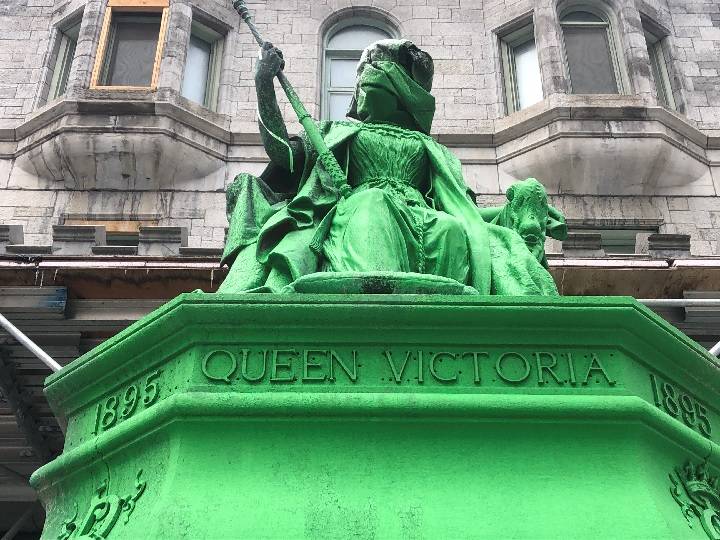In a May 17 press release, the Montreal May Anarchists (MMA) claimed responsibility for vandalizing the statue of John A. Macdonald in Place du Canada and the statue of Queen Victoria in front of the Schulich School of Music on Sherbrooke street. According to their statement, the group doused the statues in green and red paint, choosing these colours for their anti-colonial and anti-imperial connotations, in response to the encouragement of another anti-colonial activist group, ‘Brigade de solidarité anticoloniale Delhi Dubin.’.
The Queen Victoria statue, along with another statue of the monarch at Square Victoria, was previously vandalised with green paint in March. The anti-colonial group ‘Brigade de solidarité anticoloniale Delhi Dubin’ claimed responsibility for both acts in an online statement . According to the statement, the Brigade also planned a demonstration on March 24, close to St. Patrick’s Day, because of their belief that the statues, in their glorification of colonial figures, are an insult to the legacy of Irish freedom fighters.
“Our action is [an] expression of anti-colonial and anti-imperialist solidarity, and we encourage others to take similar action against racist monuments,” Brigade member Udham Connolly wrote in the statement.
The MMA responded to the call, recognizing the Brigade in its press release following the most recent act of vandalism, as well as #MacdonaldMustFall, another activist group that previously spray-painted the Macdonald monument on the International Day for the Elimination of Racial Discrimination on March 21.
“The Macdonald Monument and the Queen Victoria statue should be removed from public space and instead placed in archives or museums, where they belong as historical artifacts,” the MMA wrote in their press release. “Public space should celebrate collective struggles for justice and liberation, not white supremacy and genocide.”
Preservation of controversial historical figures in public spaces has long been the subject of debate, particularly on college campuses. Suzanne Morton, a professor in the McGill Department of History, believes such monuments are significant in that they reflect how we choose to represent and pass down our history.
“There is the actual person […] being commemorated, the history of the monument itself, and the way that current concerns interact with how [people] understand the [person] in the present,” Morton said in an interview with The McGill Tribune. “[Statues of Macdonald were] vandalized in the 1960s as a symbol of English Canadian domination of Quebec, and today, as a symbol of colonialism often associated with Indigenous peoples. The particular issues of criticism change over time.”
Though she acknowledged that it is difficult for a single monument to represent an individual’s multifaceted legacy, Morton hopes that, the McGill community is up to the task of making our monuments more accurately represent the nuances of our history.
The push to eliminate reminders of colonial legacies also fuelled the recent #ChangeTheName campaign, which sought to scrap the former name of McGill’s men’s varsity teams. As organizers of #ChangeTheName, representatives of McGill’s Indigenous Students Alliance (ISA) are sympathetic to the principles espoused by off-campus anti-colonial groups. .
“The ISA stands in accordance with the message that vandalizing colonial artifacts on Indigenous territory sends,” Ella Martindale, former co-chair of the ISA, wrote in an email to the Tribune. “They do not belong on this land, and hopefully one day, those who oppose colonial violence, Indigenous peoples included, will be able to have these particular statues taken down.”








